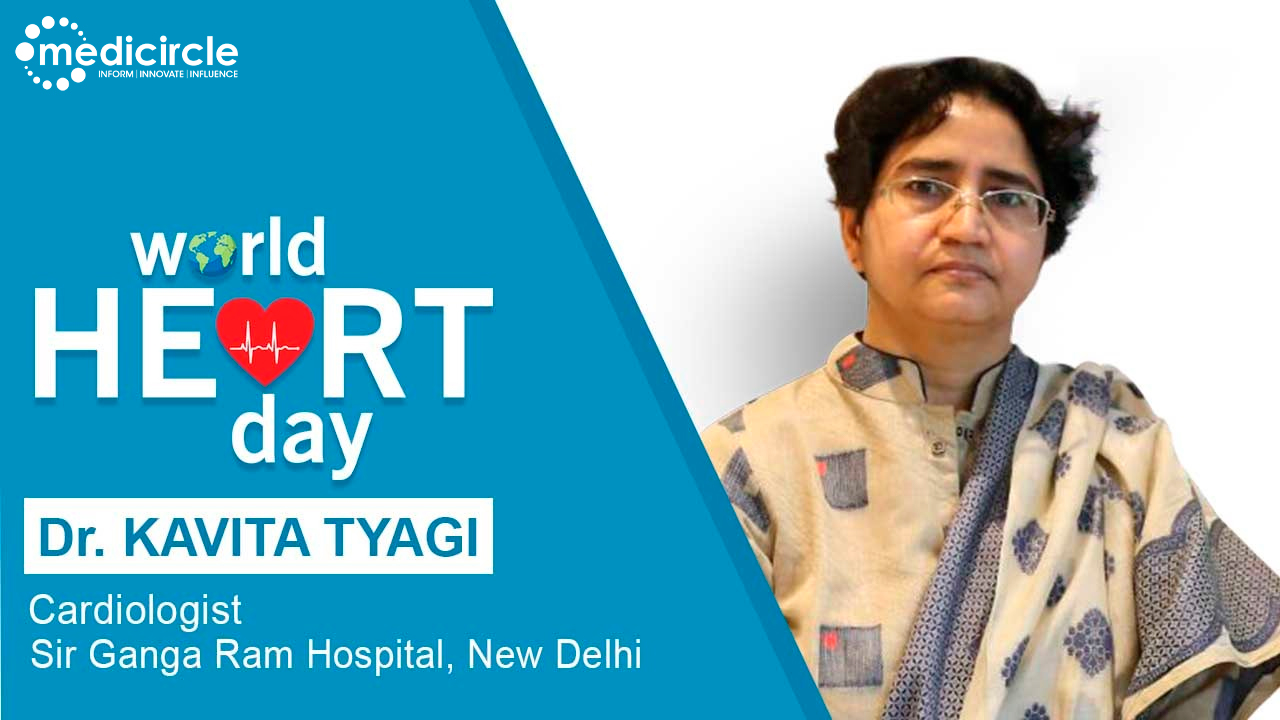World Heart Day is celebrated and organized by the World Heart Federation. This day is celebrated to inform people about cardiovascular diseases which are the biggest cause of death. The day highlights the ways in which CVDs can be prevented by changing one's lifestyle. It is estimated that 80% of premature death from a stroke can be prevented.
In 2016, CVDs contributed to 28.1 percent of the total deaths, as compared to 15.2 percent in 1990. Furthermore, in Punjab, Kerala and Tamil Nadu, the prevalence of CVDs is at least 5000 per 100,000 people. Mizoram and Arunachal Pradesh are the only two states where the prevalence of CVDs is less than 3,000 per 100,000 people.
Dr. Kavita Tyagi is an Interventional Cardiologist in Old Rajendra Nagar, Delhi, and has experience of 12 years of in this field. Dr. Kavita Tyagi practices at Sir Ganga Ram Hospital in Old Rajendra Nagar, Delhi.
She also passed her knowledge and shared her experience as an Assistant lecturer in Forensic Medicine and Toxicology at Rajiv Gandhi Medical College, Kalwa, Thane. Her latest additions in her work experience include the role of Associate Consultant, Electrophysiology and Pacing at Fortis Escorts Heart Institute, Okhla Delhi.
Common heart diseases
Dr.Kavita Tyagi says, “Heart attack is dangerous and people have the perception that heart attack is a major and common problem. Herat is a muscular organ.
Heart muscle diseases are as follows-
Hypertrophic Cardiomyopathy Dilated Cardiomyopathy Restrictive Cardiomyopathy
The pericardium which is the outer layer of the heart may get affected causing pericarditis.
The valve diseases may also get affected. The valves connect the 4 chambers of the heart which causes circulation. The valves are as follows
Mitral valve. Aortic valve Pulmonary valve Tricuspid valve
Structurally, heart diseases are classified as-
Heart muscle disease Heart valve diseases Heart outer layer diseases Conduction system diseases
The heart has a conduction system that helps it in beating on its own. There is an inbuilt pacing chamber which is known as follows-
Sinus node AV node
Complete heart block may refer to problems in the conduction system or blockage of arteries of the heart.
Conduction system disorder needs a pacemaker Blockage of heart arteries needs angiography and surgery as required.”
Coronary Artery Disease
Dr. Kavita informs, “Coronary Artery Disease results from blockage of three main arteries which supply the heart. The heart is a muscular pump and it needs blood supply from these 3 arteries. When there is a disease of these 3 arteries, it is called cardiovascular disease. Coronary Artery Disease refers to the disease of coronary arteries
Risk factors Coronary Artery Disease
High cholesterol Diabetes Blood pressure Sedentary lifestyle Smoking Alcohol Unhealthy diet Lack of exercise
90 % of risk factors of Coronary Artery Disease are preventable.
Valve diseases are conduction disorders of the heart that cannot be prevented.
Lifestyle habits and prevention for heart disease
Dr. Tyagi informs, “Taking stress is bad for health. Stress is part of life. Make sure to relax and peacefully and not to take the stress. Lifestyle habits -
Stressful behaviors Healthy Diet to control diabetes, HTN, and cholesterol Avoid junk food and empty calories Include physical activity Avoid trans fats Avoid refined sugar and flour Home-cooked healthy meals and unhealthy foods Avoid maida and ghee Take healthy fruits Include basic dietary habits
Implement these habits
Genetic heart disorder and heart attack prevention
Dr. Tyagi states, “ In females before 60 years of age and in males before 65 years of age, heart problems are possible in form of premature CAD(Coronary Artery Disease).. This is common because of a healthy lifestyle. In the case of genetic composition, regular check-ups for -
Blood pressure Diabetes Cholesterol Test to check arteries- CT arteriography is very important."
Difference between Cardiac arrest and heart attack
Dr. Tyagi informs, “ Cardiac arrest occurs due to atrial fibrillation which immediately requires a cardiac shock to revive. Cardiac arrest carries genetic components and family history should be investigated in such conditions. Testing such as -
ECG Genetic testing may help.
People having genetic cardiac diseases can be saved with proper treatment and analysis."
(Edited by Dr. Rati Parwani)

 A must watch episode of Dr Kavita Tyagi giving insights about the heart system and various abnormalities of the heart other than the dangerous heart attack which is prevalent this year. She gives valuable insights on heart diseases and how they can be controlled with regular monitoring and check-up
A must watch episode of Dr Kavita Tyagi giving insights about the heart system and various abnormalities of the heart other than the dangerous heart attack which is prevalent this year. She gives valuable insights on heart diseases and how they can be controlled with regular monitoring and check-up







.jpeg)
.jpeg)

.jpeg)
.jpeg)
.jpeg)
.jpeg)
.jpeg)





.jpeg)






.jpeg)
.jpeg)




